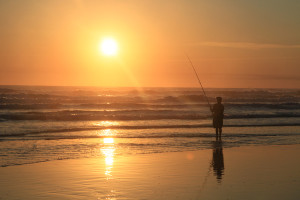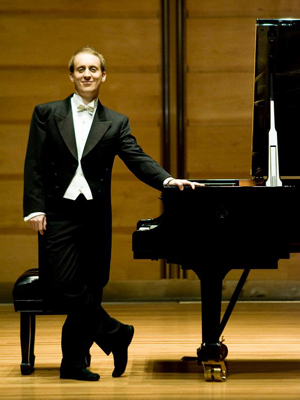By Simon Tedeschi
Article below reproduced from the Sydney Morning Herald, 13 October 2013
What do you do to unwind when you’re a highly strung musician? For concert pianist Simon Tedeschi it’s beach fishing.
 When I was about 12, my family had a special, but in retrospect rather annoying, game called “heaven”. It consisted simply of each of us describing what combination of activities epitomised the greatest sensory pleasures.
When I was about 12, my family had a special, but in retrospect rather annoying, game called “heaven”. It consisted simply of each of us describing what combination of activities epitomised the greatest sensory pleasures.
My dad usually said something like, “Playing chess, listening to Dire Straits and eating osso bucco before going on a long bushwalk.” My mother would have chimed in with, “Lying under nanna’s goose down doona, reading Rohinton Mistry and listening to Simon play Chopin.”
Then it would be my turn, and the answer would always be the same because I loved so few things in life and was as weird as a stick insect: “Eating chopped liver, reading P. G. Wodehouse and watching Roman Polanski films before going beach fishing.”
I didn’t want Chopin. I wanted silence, the kind that would shut my tremulous soul up. The type of silence that only fishing could bring. I loved fishing as a child but my burgeoning musical career ensured I would not fish again until I was a 30-year-old grown man.
These days, my mother has a holiday house on the NSW north coast at Wooli, a sleepy hamlet half an hour south of Grafton.
On a thrashing beach in Wooli I was reunited with my favourite pastime. It was the great Italian pianist Michelangeli who made the remark that to be a concert pianist necessitated great sacrifice. I knew all about sacrifice. A life of sacrifice meant that an experienced fisherman was needed to mentor me. Enter Bruce, our neighbour, the Svengali of the spool.
In Wooli you mainly catch bream. If you’re lucky, you’ll haul a big jewfish, and now and then you’ll snag a salmon, which is good for swagger purposes but tastes like shit (the edible ones are in Europe, where there are more pianists to catch them). It was on the beach that my mother reeled in a mammoth jewfish – a whopping seven kilos. There’s a photo of her holding it, affixed to her fridge. The creature is so big it dwarfs her tiny frame like a silver cowl. Mum is smiling and the fish is discontented with its position.
Why would I, a person mired in low-level anxiety, enjoy fishing, which, to some, is the most banal of pursuits? Like smoking, it allows one to do both something and nothing at the same time but, unlike cigarettes, does not elicit guilt.
For somebody like me who simply cannot turn off, there’s nothing else like this. Buddhists refer to this neurological news ticker as “monkey mind”, but then again, the Dalai Lama has probably never had to play Tchaikovsky on live television.
Fishing is so single-minded a task that even the most intractable of problems float to the periphery of my awareness while I let the briny air infiltrate my ratty tracksuit, my shoes, my hair, everything. I stink, but I’m happy.
I don’t enjoy the taste of fish. To me, it tastes insipid and paltry, more Dittersdorf than Mozart. It’s the process I love, because I can come close, if not actually arrive at, dharmic bliss.
The line itself, both slack and tightly wound, is as ornate as any piano string. Like a tuner, one can draw it in with vulgar speed or minute finery, depending on the type of fish you want to lure. And, of course, there is the bait, a once alive but now gelatinous blob, hooked and cast out as fodder for bigger things.
 It’s not all fun. I won’t even try to rig up the line because I know I can’t hack it. Bruce, with his rack-of-lamb hands, slides the nylon thread through a needle-thin aperture, ties a series of knots (one of which has an Italian name I only remember as “cabanossi”), attaches a weight called a sinker and an anti-tangle contraption called a swivel, then impales the “occy” bait on the serrated hook with a pragmatic brutality. I feel cast aside out of necessity. He does this each and every time I get snagged (line caught), baited (eaten by fish), broken off (snapped line), or if I actually catch a blasted fish.
It’s not all fun. I won’t even try to rig up the line because I know I can’t hack it. Bruce, with his rack-of-lamb hands, slides the nylon thread through a needle-thin aperture, ties a series of knots (one of which has an Italian name I only remember as “cabanossi”), attaches a weight called a sinker and an anti-tangle contraption called a swivel, then impales the “occy” bait on the serrated hook with a pragmatic brutality. I feel cast aside out of necessity. He does this each and every time I get snagged (line caught), baited (eaten by fish), broken off (snapped line), or if I actually catch a blasted fish.
As someone who has been inculcated since childhood with the need to be entirely self-reliant while on stage, relying on this kind man over and over again leaves me wrong-footed, even defensive. He puts me at ease, though, as if he knows instinctively what’s going on.
It was after this trip that I had to cut my losses, face up to the fact that I had an empty esky, dart back to Sydney and perform Schubert’s landmark work The Trout Quintet. The third movement imagines a trout, happy and free, gushing through Austrian waters.
It’s a blissful work but the performance did not go to plan. In my mind’s eye, I was still on that beach, feeling the tiny perturbations of the reel on my flesh, knowing that I was within a few cycles of conquest. That evening, I played the Schubert with a ham-fisted anger, the trout my sworn enemy, taunting me with his freedom. I had been snagged.
I’ll never be a fisherman. Unlike Bruce, I’ll never be able to scan a patch of surf and know preternaturally where the action is. The crazed, faltering ostinato of a dying fish – slap slap slap – its eyes beady and death-crazed, will never be my kind of music. But perhaps, above all, what fishing has taught me is that music is far from the only universal language.